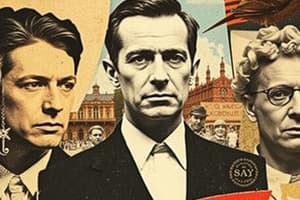Podcast
Questions and Answers
What is the primary distinction between management and leadership?
What is the primary distinction between management and leadership?
- A leader is someone who enforces rules, while a manager is inspirational.
- Management is a career, while leadership is a calling. (correct)
- Managers often take risks, whereas leaders prefer structured environments.
- Leadership requires formal authority, while management does not.
How do managers typically gain their position within an organization?
How do managers typically gain their position within an organization?
- By demonstrating exceptional interpersonal skills.
- By having a clear vision for the company's future.
- Through loyalty and tenure in the organization. (correct)
- Through proven leadership qualities.
What is a characteristic of effective leadership?
What is a characteristic of effective leadership?
- Having a vision that others willingly support. (correct)
- Maintaining strict control over team dynamics.
- Possessing strong organizational skills.
- Holding a formal authority role within the organization.
Which statement about leadership is accurate?
Which statement about leadership is accurate?
What is necessary for a manager to be considered effective?
What is necessary for a manager to be considered effective?
Which competency is NOT required at the organizational level of leadership?
Which competency is NOT required at the organizational level of leadership?
What is a primary aspect of strategic leadership?
What is a primary aspect of strategic leadership?
Which of the following is NOT part of the strategic leadership process?
Which of the following is NOT part of the strategic leadership process?
Which function of leadership includes creating followers?
Which function of leadership includes creating followers?
Which characteristic is essential for effective strategic leadership?
Which characteristic is essential for effective strategic leadership?
Which of the following is NOT considered a key component common in almost all definitions of leadership?
Which of the following is NOT considered a key component common in almost all definitions of leadership?
What is a primary focus of group-level leadership?
What is a primary focus of group-level leadership?
Which of the following describes an aspect of personal leadership?
Which of the following describes an aspect of personal leadership?
Which element is NOT identified as a key component in Lussier and Achua's definition of leadership?
Which element is NOT identified as a key component in Lussier and Achua's definition of leadership?
What does the process of leadership primarily encompass?
What does the process of leadership primarily encompass?
What role do leaders play in group-level leadership?
What role do leaders play in group-level leadership?
In the context of leadership, what is one of the outcomes of constructive change?
In the context of leadership, what is one of the outcomes of constructive change?
What is the primary focus of most leadership scholars?
What is the primary focus of most leadership scholars?
Which of these levels of leadership focuses on an individual's self-discipline and integrity?
Which of these levels of leadership focuses on an individual's self-discipline and integrity?
Which of the following definitions describes leadership as an influencing process?
Which of the following definitions describes leadership as an influencing process?
What aspect distinguishes leadership from management?
What aspect distinguishes leadership from management?
Which statement accurately reflects collaborative leadership?
Which statement accurately reflects collaborative leadership?
Which characteristic is not typically associated with effective leadership?
Which characteristic is not typically associated with effective leadership?
What is a major difference in the focus of leadership definitions over time?
What is a major difference in the focus of leadership definitions over time?
What role does vision play in effective leadership?
What role does vision play in effective leadership?
What is considered a common misconception about leadership?
What is considered a common misconception about leadership?
What is primarily associated with management?
What is primarily associated with management?
Which question type is more aligned with leadership?
Which question type is more aligned with leadership?
Which of the following is a characteristic of managers?
Which of the following is a characteristic of managers?
What does leadership primarily emphasize?
What does leadership primarily emphasize?
Which activity is NOT associated with leadership?
Which activity is NOT associated with leadership?
Which aspect of management is emphasized in short-term objectives?
Which aspect of management is emphasized in short-term objectives?
How do leaders typically approach challenges?
How do leaders typically approach challenges?
What key function distinguishes strategic thinking?
What key function distinguishes strategic thinking?
Flashcards
Leadership
Leadership
The ability of an individual to guide and motivate others toward achieving common goals.
Functions of Leadership
Functions of Leadership
The various roles, responsibilities, and actions undertaken by leaders to achieve organizational objectives.
Levels of Leadership
Levels of Leadership
Different levels of influence and responsibility within an organization, from individual contributors to senior executives.
Elements of Leadership
Elements of Leadership
Signup and view all the flashcards
Difference: Leadership vs. Management
Difference: Leadership vs. Management
Signup and view all the flashcards
Similarities: Leadership and Management
Similarities: Leadership and Management
Signup and view all the flashcards
Leadership as a process
Leadership as a process
Signup and view all the flashcards
Leadership as Visionary
Leadership as Visionary
Signup and view all the flashcards
Strategic Leadership
Strategic Leadership
Signup and view all the flashcards
Strategic Leadership Process
Strategic Leadership Process
Signup and view all the flashcards
Organizational Level Leadership
Organizational Level Leadership
Signup and view all the flashcards
Technical Competence in Leadership
Technical Competence in Leadership
Signup and view all the flashcards
Social Competence in Leadership
Social Competence in Leadership
Signup and view all the flashcards
What is the core of leadership?
What is the core of leadership?
Signup and view all the flashcards
What are the essential inputs in the leadership process?
What are the essential inputs in the leadership process?
Signup and view all the flashcards
What is the primary outcome of the leadership process?
What is the primary outcome of the leadership process?
Signup and view all the flashcards
What is one key element common in leadership definitions?
What is one key element common in leadership definitions?
Signup and view all the flashcards
What role does influence play in leadership?
What role does influence play in leadership?
Signup and view all the flashcards
How do leaders and followers interact in leadership?
How do leaders and followers interact in leadership?
Signup and view all the flashcards
What is the focus of personal leadership?
What is the focus of personal leadership?
Signup and view all the flashcards
What is the scope of strategic leadership?
What is the scope of strategic leadership?
Signup and view all the flashcards
What is Leadership?
What is Leadership?
Signup and view all the flashcards
What is Management?
What is Management?
Signup and view all the flashcards
What is the role of Leadership in Change?
What is the role of Leadership in Change?
Signup and view all the flashcards
Why do people follow Leaders?
Why do people follow Leaders?
Signup and view all the flashcards
How do Managers and Leaders differ in their focus?
How do Managers and Leaders differ in their focus?
Signup and view all the flashcards
What do Managers do?
What do Managers do?
Signup and view all the flashcards
What do Leaders do?
What do Leaders do?
Signup and view all the flashcards
Leading is...
Leading is...
Signup and view all the flashcards
Management is...
Management is...
Signup and view all the flashcards
Difference between Leadership and Management?
Difference between Leadership and Management?
Signup and view all the flashcards
Similarities between Leadership and Management?
Similarities between Leadership and Management?
Signup and view all the flashcards
Study Notes
Foundation of Leadership
- Leadership is defined as an influencing process between leaders and followers, aiming to achieve organizational objectives through changes.
- Leadership is also a process where an individual impacts a group to achieve shared goals.
- Leadership involves interaction between leaders and followers, including their environment.
- Leadership components include the process, influence, group context, and goal attainment.
- Elements of leadership include organizational objectives, people, process, influence, change, and leaders-followers.
- Current interpretations of leadership encompass a deeper understanding of its diverse functions, levels, and elements.
Characteristics of Leadership
- Leadership is a process and interaction involving both leaders and followers.
- Leadership involves multidirectional negotiating and influence.
- Leadership encompasses common and individualized goals, which are contextual.
- Effective leadership promotes positive, constructive change.
Levels of Leadership
- Personal leadership focuses on self-development, discipline, integrity, and personal development.
- Direct leadership involves leading a team toward a common objective through collaboration.
- Organizational/Managerial leadership involves influencing an entire organization towards goal attainment through structured efforts.
- Strategic leadership transcends time and space, envisioning a global opportunity, mobilizing resources and creating value for society.
Requirements for Strategic Leadership
- Selfless devotion and commitment
- Strategic thinking
- Courage
- Resilience
- Openness and navigating skills
- Discipline and a visionary approach.
Strategic Leadership Process
- Strategic thought process
- Selling/communicating the vision
- Strategic planning
- Strategic implementation
- Strategic evaluation
- Strategic review
Functions of Leadership
- Inspire a shared vision.
- Cultivate followers through providing value and enabling self-leadership qualities.
- Promote constructive changes based on stakeholder needs.
- Resolve and mediate conflict, while effectively solving problems.
- Manage and utilize resources for the achievement of the vision.
Leadership & Management
- Managers and leaders are often used interchangeably to represent individuals leading a firm.
- Management is a career while leadership is a calling.
- Leaders inspire natural followership by drawing individuals towards their vision.
- Managers require formal authority to ensure efficiency and effectiveness.
- Managers focus on efficiency and short-term results (doing things right), whereas leaders focus on effectiveness and long-term strategic goals (doing the right things).
- Management involves planning, directing, organizing, measuring, and controlling.
- Leadership is the main component of change, focused on vision, dedication, and empowering others for change.
Differences between Leadership and Management
-
Management (tactical thinking) focuses on efficiency (doing things right).
-
Leadership (strategic thinking) focuses on effectiveness (doing the right things).
-
Leadership focuses on long-term goals and change.
-
Management focuses on short-term structures and maintaining the status quo.
-
Leaders innovate, develop, inspire, and have a long-term vision, as well as asking “what” and “why”.
-
Managers administer, maintain, control, and focus on short-term goals.
Studying That Suits You
Use AI to generate personalized quizzes and flashcards to suit your learning preferences.




